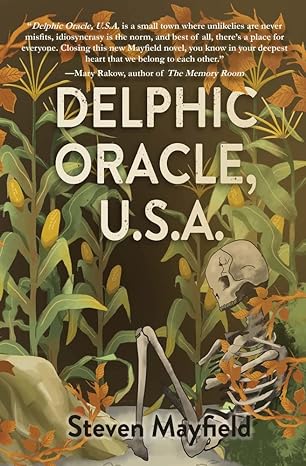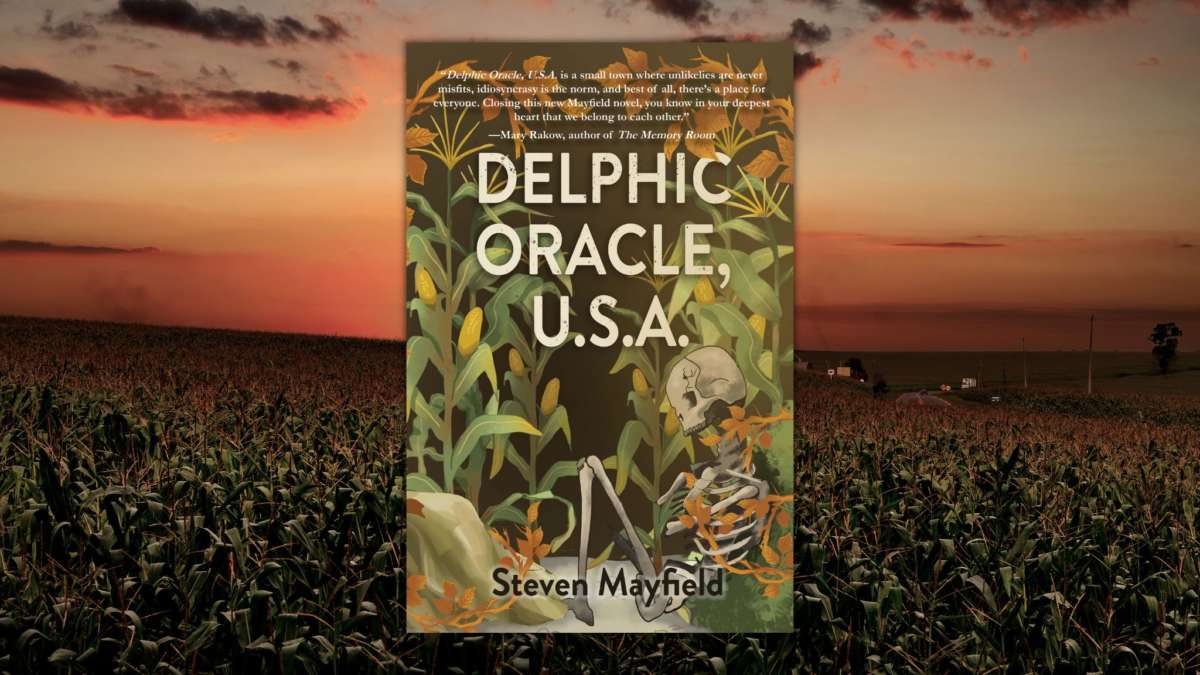Delphic Oracle U.S.A. by Steven Mayfield
I found this wonderful quote from historian and writer Terrence Des Pres on the website of author John Irving: “Superior fiction asks three things of the novelist: vigorous feeling for life as we live it. Then imaginative force, strong enough to subvert and rebuild unhindered. And then–but this is rare and so essential that we might call it the ‘reality principle’ of fiction — shrewd sense to keep the first two locked in stubborn love with each other.”
If you’re wondering what I was doing on John Irving’s website, it was to remind myself how addicted I was to his early works, with marvelous descriptions and settings, stories that go off on tangents simply for the sake of creating magnificent literary tributaries, and the quirkiest of characters doing quirky things. Within that context, Irving introduced us to small towns with quirks of their own, where the land and the locale were as much characters as the characters.
I needed a refresher in my love for Irving because I was so reminded of his work in the brilliant novel Delphic Oracle, U.S.A. by the gifted author Steven Mayfield.
“Delphic Oracle [Nebraska] is a small town,” Mayfield writes. “It never takes long for an embarrassing situation to circulate.” Translation: No news is news for long.
Embarrassment, I suppose, is in the eyes of the beholder, but pure pleasure from Mayfield’s craft as a wordsmith and storyteller, at least to this reviewer, is not subject for debate.
The story’s narrator, Peter Goodfellow, is a city manager, parish priest and inmate at the Luther Burbank Correctional Facility – go figure that combo. Thoughtfully, he warns readers at the outset that they will be introduced to many characters, most from three primary families, but not to worry – you need not remember them all. “Some will become friends, others mere acquaintances. You’ll forget a few that matter, hang onto a few that don’t.”
He adds this helpful hint: “Among the folks inhabiting these pages are a librarian, a con man, an enchantress, and a skeleton. Keep your eye on them.”
Some of what your eyes will see:
When the narrator’s younger brother suddenly has the urge to skip town, people gather at the local barbershop to enter a pool for when they think he’ll return. There’s an acquired strategy to their guesses here – Teddy pulls this stunt quite regularly.
MARVELOUS DESCRIPTIONS AND SETTINGS
How about when Francis, the narrator’s brother-in-law, tries to fix the battery in his old nearly cherry Chevy pickup, drops a wrench down the hood, and gets his arm caught while trying to retrieve it? A parade of town folks stops by, either to help free him, offer him a coke (to hold with his other hand of course), or to inquire wasn’t that the wrench he stole from the local hardware store that he will have to answer for.
While Francis is described as a man of religion without faith, his fishing buddy Beagle is a man of faith without religion, who sets out to interview various religions in a sort of March Madness competition. “I’ve been flying under God’s radar,” he says.
Mayfield writes of a town called Alinin, Kansas, which is not quite a town but rather a geographical line – hence, Alinin…Kansas. Get it?
When an ages-old skeleton is stumbled upon, the area is “roped off” with leftover crepe paper used to make a float at the town’s annual July 4th parade. Among the clues is a garment tag from a store in Chicago, which could point to anyone from Al Capone to July Pennybaker, a smooth and charming con man/manipulator who can recite Shakespeare as easily as he can heist $10,000 from the mob.
The story juggles between the town’s early history — as told to Peter in flashbacks from his great-grandmother Willa Louise Goodfellow — to current times and its current cast. That early history, among other relationships, focuses on the one between Pennybaker and the beautiful, intelligent and seemingly street-wise Margaret Westinghouse, who has arrived in town with her mother along with a history with holes. They make a fascinating pair.
A MARVELOUS WORK OF STORY, PERSONALITY AND DESCRIPTION
All this is to encourage readers to lose themselves in Mayfield’s “vigorous feeling for life” and his “imaginative force.” In the words of Goodfellow, you won’t remember all the characters. But that doesn’t mean you won’t want to – or shouldn’t try.
Mayfield believes a writer should keep readers “firmly attached to the narrator’s hip and not waste their time, that it’s possible to forward a serious point without making the reader feel wretched, and that the simple declarative sentence is often more elegant than a florid metaphor.”
One of the characters in Delphic Oracle, U.S.A., with too much leisure time on his hands, reasons that “a baseball game on TV wasn’t going to watch itself.” Delphic Oracle, U.S.A. is a marvelous work of story, personality and description. Mayfield has created a small town in which readers can get lovingly lulled into watching, from a perch on a barbershop stool to a porch rocker with a lemonade (or stronger).
It’s a place of routine, Teddy says, where nothing changes. Until, of course, it does.
About Steven Mayfield:
Steven Mayfield is a past recipient of the Mari Sandoz Prize for fiction and a 2021 Silver Medalist for the Benjamin Franklin and Nautilus Book Awards. He is author of over 50 scientific and literary publications, and author of Treasure of the Blue Whale (Regal House 2020) and Howling at the Moon (Mt. Parnassus Press 2010). He lives in Portland, OR, with his wife, Pam, and a pair of dogs who can be annoyingly insistent around meal-time. He and Pam share five grown children. He can order beer in four languages. His wife can say, “Pay no attention to this man” in five.






